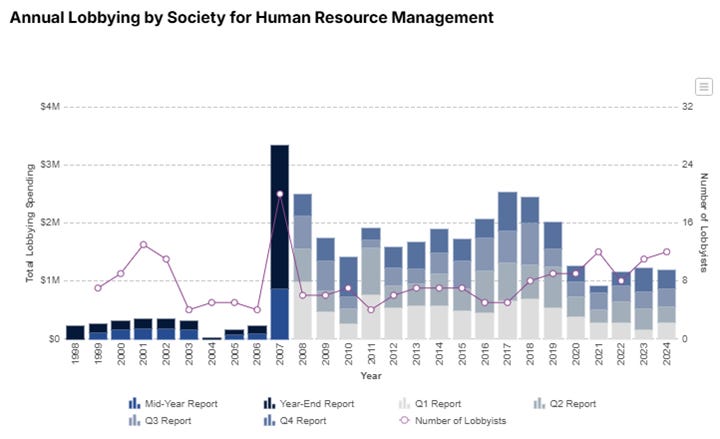Newsletter #23 (3/31/2025)
Doomscrolling causes recessions, DeepSeek AI, SHRM lobbying for FLSA changes
If we do tip into a recession (or already have), you can partially blame your endless doom scrolling.
No, seriously. And nearly every other American’s habit of doom scrolling. There have been studies done – here and here, for example – in which human behavior essentially predicates its own ending. In other words, as our society becomes more negative about something, the negativity creates more negative behavior, which perpetuates the negativity, which creates more negative behavior. The cycle continues until it reaches its inevitable ending. Americans, in particular, seem particularly good at this.
Look no further than some of the headlines popping up just in the last week:
Fedex CFO with unique insight gives ominous warning about US economy, Consumers' short-term economic expectations fall to lowest level in 12 years, trigger recession warning, US Housing Market Looks 'A Lot Like 2008' Bubble—Real Estate Analyst, The Long-Term Budget Outlook: 2025 to 2055 | Congressional Budget Office, and Recession signs are flashing in 44 states as tariff risks and DOGE cuts threaten growth, for example.
I mean, don’t get me wrong – the CBO analysis for 2025-2055 contains some doozies of facts on the outlook of our financial affairs in the U.S. like the below:
While yes, that is troubling, there is always trouble abound when you go around looking for it. It gets more difficult to see the silver linings and the positive things that still occur no matter what is happening around you. Go looking for those more often. Turn off your incessant phone notifications – especially if you obsess about the news cycle – and only pay attention to what really matters to you. Take action to limit your doomscrolling (some tips here from the Mayo Clinic) and pay attention to only what you can control. Yes, there are serious problems that need to be addressed in the U.S. and the world, but make sure you keep all of that in check with “what can I do about that today?”
Deepseek AI is now considered a weapon of mass destruction.
Think about that for a minute. While it is entirely possible it is clickbait or an attempt at grabbing headlines, the fact it was spoken into existence by a respected cybersecurity expert should raise some eyebrows.
The director of Spain's National Cybersecurity Institute (INCIBE), Félix Juárez, issued the warning during his speech in Israel last week, saying that open-source generative AI should be considered a weapon of mass destruction. More specifically, he said that the Chinese AI DeepSeek is "an extremely competitive training tool" and is "a weapon of mass destruction in cybersecurity". Moreover, he said, “the release of DeepSeek has shown us that this technology is now more affordable and accessible than ever. At zero cost, it provides a highly competitive AI-based training capability.”
The performance is there, relatively speaking, to outcompete other generative AI platforms and their capabilities (see chart below). Mr. Juarez sees something in this performance data to cause him to use these words so it is worth paying attention to.
Good ol’ SHRM asked Congress to update the Fair Labor Standards Act.
While the answer is yes to the question of, “Does Congress need to update the Fair Labor Standards Act?”, it seems odd timing to be asking Congress to tackle this now, which is what SHRM did last week.
Of all the important topics to be asking Congress to tackle, I would not consider the FLSA to be of such priority that this is what SHRM picked to lobby on now. I do not disagree that overhauling the exemption tests, for one, is sorely needed, and they rightfully pointed out how ridiculous it is how the “U.S. Department of Labor’s frequent proposing and publishing of new regulatory interpretations, followed by lawsuits challenging their legality, creates uncertainty for workers, organizations, and HR professionals.”
But, lobbying Congress to get serious about immigration reform, streamlining funding and simplifying regulations for creating businesses, or generative AI seem to be more urgent than the FLSA. Hell, SHRM basically ignored three or four of the five workplace policy issues they themselves named for 2025!
But, hey, maybe they’ll get back around to it. SHRM spends about $1 million per year on lobbying efforts in the U.S., according to Open Secrets. If you are ever curious on what they spend their money on for lobbying efforts, you can go here: Society for Human Resource Management Bills Lobbied • OpenSecrets.
Mark Cuban says his mission is to revolutionize US health care.
That is according to an interview he gave last week to The Hill. Mr. Cuban, who has made good on his promise through his company Cost Plus Drugs to attack prescription drug costs in the US, wants the federal government to continue the fight in lowering health care costs. More specifically in this particular case, Cuban wants to “empower independent pharmacies” and cut out the middleman – pharmacy benefit managers – who artificially inflate the costs of certain drugs.
Cuban faces an uphill battle, though. Healthcare in the United States is, quite simply, an economic juggernaut. Recruitonomics recently released the first part of a four issue deep dive into the healthcare labor market. Demographics, spending, and advancements in technology are just some of the many factors which continue to drive the healthcare industry.
Ignoring fraud, waste, and excessive profit-taking which consistently bloat the industry, it is a fact that the industry continues to grow as our population ages. This drives employment, which continues to grow at a rapid clip compared to other industries. In addition, at one point it was estimated that the Affordable Care Act added 500,000 jobs (as of 2017) to the healthcare industry, largely because more people were insured which in turn drove consumption of healthcare services.
Mr. Cuban will need a lot of help to accomplish his mission as he faces down an industry which – let’s face it – is geared towards continually growing, not becoming more efficient.
------------------------------------------------------------------------------------------------
© March 2025, Brandon Caldwell. All rights reserved. Hyperlinks are used frequently for proper credit to source material on respective websites, news articles, social media or other sources. Images are used with and in credit to rights reserved to their respective owner(s). While it can be a useful tool, no ChatGPT or other generative AI was used in the production of this newsletter. Opinions are mine and do not reflect the opinion or policy of others including employers past or present.








